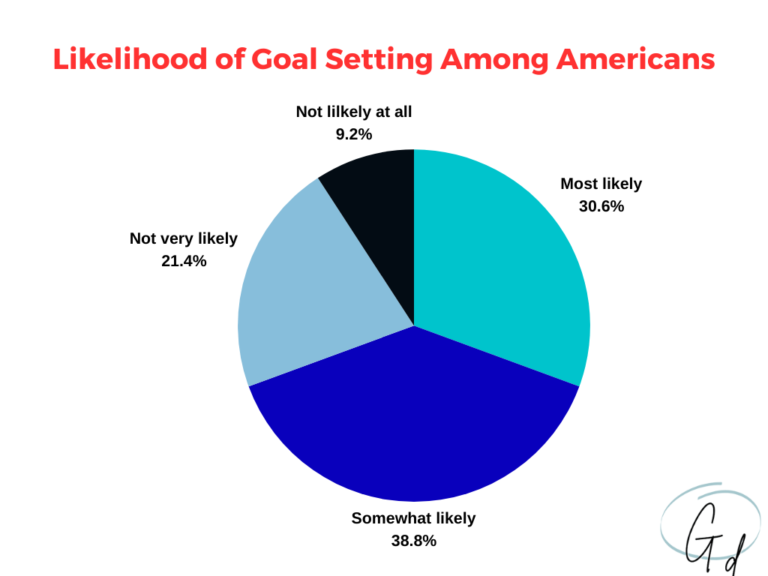Setting Unrealistic Goals: Why is so Dangerous for Success?
Everyone has dreams.
We should work hard to achieve them, but setting unrealistic goals is easy.
Working as an account manager from 9 to 5 and as an SEO specialist taught me a lot about setting smart yet achievable targets.
Goals should push you but also be within your grasp.
That’s why it is important to set challenging but achievable goals.
You must apply this principle for every area of life of goal-setting.
You need balance and an understanding of what can really happen in the time you have.
I’ve seen many aims for the stars without a ladder.
Let’s make sure your ladder is sturdy and tall enough to reach those stars safely and effectively.
Keep reading if you want to know how to avoid unrealistic goals and set yourself up for success instead.
Key Takeaways
- Setting unrealistic goals can cause stress and burnout because they don’t consider your current situation or the steps needed to reach them.
It’s better to aim for goals that push you but are still within your reach. - Break down big dreams into smaller, short-term goals and set specific deadlines for each step. This method helps keep you motivated and on track without feeling overwhelmed by the bigger picture.
- Sharing your goals with a friend or coworker will boost your productivity and give you a partner in your journey. They can offer support, keep you accountable, and provide valuable feedback.
- Understand where you currently stand before setting new goals. Reflecting on what works well and what doesn’t in both personal and work areas helps avoid setting unrealistic targets.
- Adjust your goals as needed based on progress tracking and feedback from others. Flexibility allows you to stay ambitious while also being realistic about what’s achievable given available resources like time, money, and skills.
What are the characteristics of unrealistic goals?
Unrealistic goals often seem very big or too good to be true.
They might make you feel excited at first, but they’re like trying to climb a mountain in one day without training.
These goals don’t consider your current situation or the steps needed to get there.
In fact, unrealistic goals:
- Are disproportionate to your resources: This could be time, money, skills, or even support networks. For instance, wanting to become a concert pianist in a year with no prior musical training is likely unrealistic.
- Have too tight timeframes: While ambitious goals are great, they need to consider the time it takes to develop skills or achieve milestones. Trying to run a marathon after a week of couch potato activity is a recipe for injury.
- They focus on luck or external factors. Unrealistic goals often rely on things outside one’s control. Hoping to win the lottery to achieve financial security is not an actionable plan.
- Are unclear or poorly defined: If you can’t define what “success” looks like, it’s hard to know if you’re on track. Vague goals like “be happy” are difficult to measure progress on.
- Create undue stress or anxiety: If a goal constantly makes you feel overwhelmed or helpless, it’s a sign it might need adjusting.
Examples of unrealistic goals
During my life and career, I have always set unrealistic goals.
This is before deepening the goal-setting process and understanding the key principles.
Now, let’s make some examples of unrealistic goals based on my experience.
In 2021, I started an Italian blog about digital marketing.
My goal was ” be successful and leave my job by the next year”.
Obviously, I never achieved this goal.
Why?
First of all, I didn’t have much experience in copywriting and SEO.
Also, I set a time limit that was too tight.
SEO takes time to work, and in a competitive industry like digital marketing, even more so.
I didn’t set any short term goals, like ” writing 5 articles per week” or ” acquiring 4 backlinks per month”.
I just set unrealistic goals that I never reached.
I’ll talk about the consequences of this in the paragraph.
I made the same mistake in fitness when I was younger.
I used to be skinny and fat and wanted to become a fitness model in a couple of months.
Yeah, I was seventeen so I didn’t know anything about how to set goals, but I remember my feelings very well.
I was sad, frustrated, angry, and demotivated because I worked hard, but I didn’t reach my goal.
What is the most likely consequence of setting unrealistic goals?

The most likely consequence of setting unrealistic goals is disappointment and demotivation. You’ll feel unmotivated to continue working towards your objectives.
See, setting unrealistic goals can hurt you more than you think.
Imagine working hard every day, but no matter what, you just can’t seem to reach that high bar you set.
I’ve felt this way so many times, so I know how hard it is.
Here are other consequences of setting unrealistic goals:
- Demotivation and Disappointment: When goals seem impossible to reach, you’ll start feeling demotivated. This will decrease your willpower, and you may feel discouraged.
- Burnout: The pressure to achieve an unrealistic goal can lead to emotional exhaustion. And this will lead to burnout, making it hard to even focus on smaller tasks.
- Low Self-Esteem: Repeatedly failing to reach goals can chip away at your self-confidence. You might start to believe you’re not good enough or that success is out of reach.
- Giving Up Altogether: If a goal seems too daunting, you might be more likely to abandon it altogether. This can prevent you from making any progress at all.
- Neglecting Other Areas: The intense focus on achieving an unrealistic goal can lead to neglecting other important aspects of your life, like relationships or health.
If you’re tired of feeling like this, it’s time to set better goals and avoid burnout.
How to avoid setting unrealistic goals
Ok, it’s time to work towards something in a realistic way.
It doesn’t matter if it’s your personal life or your career: you must set goals that are within your reach.
Here’s how to avoid setting goals you can’t actually reach.
Analyze your current situation

Before you set goals, know where you stand.
This is the key to setting reasonable goals.
It’s great to be ambitious, but you must face realism.
There’s nothing worse than working hard and never seeing results.
It’s like mapping out a journey—you must see your starting point.
With a life audit, you can understand what works well in your life and what doesn’t.
This step is essential to avoid the pitfall of setting unrealistic goals.
Your goals must be realistic and within your reach.
They must take into account your weaknesses and strengths.
Set short-term goals
Goal-setting is the key to success, but you must set the right goals.
Short-term goals can help you overcome difficulties and motivate yourself for long-term goals.
Start by breaking down your dreams into small, manageable steps.
These are your short-term goals.
Think of them as the building blocks that will get you closer to where you want to be.
For example, if you’re aiming to become a top salesperson in your company, set a goal to improve your weekly sales numbers first. This could be your goal for the quarter.
This method is not just theory; it’s backed by studies showing how goal setting boosts task performance and motivation.
Focus on setting goals that are attainable and within reach.
Keep each goal clear and doable within a short time frame. Say, “I will increase my customer calls by 20% this week.”
This is basically the SMART goals method, the best one to help you avoid setting unrealistic goals.
Then, work on hitting that mark before moving on to the next step up.
Set a specific deadline and what you need to do

One of the best tips to avoid setting unattainable goals is setting deadlines and creating a to-do list.
Goals are realistic when you know exactly what to do.
Don’t forget to pick a date for your goal and write them down.
48% of goal-setters always write down their goals, so it’s essential to do it.
Make it soon enough to keep you moving but far enough to be realistic.
For example, my actual goal is ” write four guest posts by the end of June”.
I always break it down into tasks I can tackle each week.
In this case, it will be:
” Send ten outreach emails per month” and ” Run a competitor gap every day to find opportunities”.
Share your goals with someone
We usually don’t want to talk about our goals until we have achieved them.
But this is a big mistake.
Having someone to talk with, like your girlfriend, your brother or sister, or a colleague, can change your life.
It’s like having an accountability partner and increasing your chance of success by almost 95%.
If you want to become fit, your accountability partner can be your coach.
They can offer feedback, help keep track, and maybe share their own experiences.
Not to mention, they can help you identify areas for improvement and overcome your obstacles.
Sharing also lets someone else hold you accountable and help you develop a high achieving personality.
If you tell someone you’re aiming to finish a big project by next month, they’ll likely ask about it later on.
This keeps you honest and pushes you harder towards that target.
Adjusting your goals is fine if needed—just keep that line of communication open for help and advice along the way.
Balance ambition and reality

Dream big, but keep your feet on the ground. The key is to maintain a healthy work life balance.
You might want to climb a mountain, but if you’ve never hiked before, start with smaller hills first.
Your goals must align with your current situation to ensure you can reach them.
Once again, it’s like about setting SMART goals.
This strategy has helped me greatly as an account manager and SEO specialist.
You want to work hard but smart.
Your journey to success should match your resources: time, money, and skills play a big role here.
Aiming for something without considering these factors might lead to stress or disappointment.
Think of it this way: setting realistic goals is not limiting; it can lead to consistent progress and real achievements.
Setting smart goals means balancing what you aspire to do with what’s actually possible.
Track and adjust your goals
Your goals must always be measurable.
You can’t track and improve something you can’t measure.
When I started working as an SEO specialist, my goal was to find 3 new clients per month.
But since I work full time, this goal was too ambitious.
I realized this over time, so I decided to lower the quota for a client.
By doing this, I could balance the two jobs and not neglect my social life.
Goals might be too ambitious, but you’re always on time to adjust them.
Make sure to adapt them to your needs and your capabilities.
Conclusion
Set goals that push you, but make sure they’re ones you can actually achieve.
Think about what’s possible right now and aim a little higher.
This way, you keep growing without getting stuck.
Talk about your goals with friends or family.
They’ll support you and might offer great advice on how to reach them sooner.
Remember, adjusting your goals isn’t giving up; it shows you’re wise enough to find a better path when needed.
As an account manager and SEO specialist, I’ve seen targets shift all the time; it’s part of success.
Start today by setting one realistic goal. Take that first step toward something amazing—it feels great.
Your journey to achieving big things begins with these small, smart choices. You got this!

About Author
Giovanni is a maestro of time management, motivation, and accountability.
With an experience of over seven years as an account manager, during the night, he transforms into an SEO consultant, one of his many passions.
In this blog, he shares his best tips on becoming the best version of yourself based on his experience. Learn more







